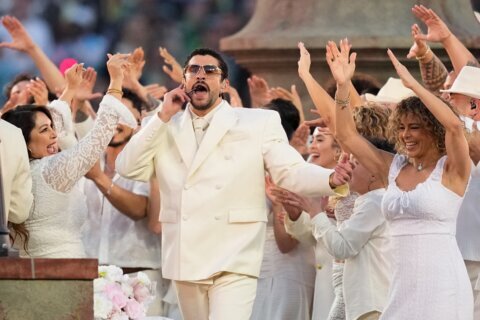WASHINGTON — The tale of Tarzan has seen numerous Hollywood incarnations since Edgar Rice Burroughs first published it in a magazine in 1912, from the dozen early talkies with Olympic swimmer Johnny Weissmuller as “Tarzan the Ape Man” (1932-1948), to Disney’s animated “Tarzan” (1999) set to Phil Collins.
Now, the King of the Jungle returns in Hollywood’s newest action adventure, “The Legend of Tarzan,” co-written by Adam Cozad (“Jack Ryan: Shadow Recruit”) and Craig Brewer (“Hustle & Flow”).
Rather than moving chronologically through Tarzan’s origins as a feral child raised by great apes in the jungles of Africa, we open years later in 1880s London where Tarzan (Alexander Skarsgard) goes by John Clayton III, earl of Greystoke. Tamed and manicured, Tarzan is now completely domesticated in his marriage to schoolteacher Jane (Margot Robbie), whose students gawk at her famous hubby.
But just when he thought he was out, the jungle pulls him back in.
A greedy diamond hunter, Belgian Captain Leon Rom (Christoph Waltz), hatches a scheme to lure Tarzan back to the Congo under the guise of an anti-slavery humanitarian effort, for which he enlists the support of George Washington Williams (Samuel L. Jackson). In truth, it’s a trap by tribal leader Chief Mbonga (Djimon Hounsou), who vows revenge against Tarzan over an incident from their past.
Both leads get the job done: Skarsgard (“True Blood”) is chiseled and hunky, while Robbie (“The Wolf of Wall Street”) is tough and sexy. Fans will find nostalgic pleasure in their steamy encounters, particularly Skarsgard’s initial encounter with Robbie, who seems to enjoy his sniffing — to a point.
Romance aside, the film is at its best in its lighthearted moments involving Jackson, who offers welcome comic relief as the cynical American Civil War veteran. As Tarzan swings from vines, sprints across tree limbs and wrestles animals, Jackson’s skeptical remarks will cause audiences to howl.
Jackson also becomes the moral compass, insisting his country’s slaughter of Native Americans makes him no better than the colonists invading Africa. This makes his character a sort of kindred spirit to African tribal leader Djimon Hounsou, who blends the enslaved bravura of Ridley Scott’s “Gladiator” (2000) with the deadly exploitation of resources in Ed Zwick’s “Blood Diamond” (2006).
Still, the strongest performance comes from Waltz, who’s a surefire Hollywood heel after his Oscar-winning killer in “Inglourious Basterds” (2009) and Bond villain in “Spectre” (2015). In “Tarzan,” his Belgian Baron ranges from sadistic — strangling foes with rosary beads — to awkwardly precise — rearranging plates and silverware with O.C.D. tendencies during a great dinner scene with Robbie.
Director David Yates, who steered the last four “Harry Potter” movies after Chris Columbus and Alfonso Cuaron, demonstrates artistry in select moments, finding symbolism in the opening image of Waltz’s rosary beads dangling from his hand as he plucks a flower — the crusader’s rape of nature.
His directorial stamp is apparent throughout, mixing rapid tracking shots through the jungle with slow-motion battles. These brawls often involve CGI apes that show just how far digital animals have evolved in a 21st century of “Dawn of the Planet of the Apes” (2014) and “The Jungle Book” (2016).
Some digital creatures work better than others: Tarzan rubbing heads with a pack of lions is a rather heartfelt moment, while an extreme close-up of a screaming ostrich looks cartoonishly digitized. Hippos, elephants and crocodiles abound — creating a feeling of Disneyland’s “Jungle Cruise” (It’s a good thing this wasn’t a Disney flick; a certain scene is eerily similar to a recent real-life tragedy).
Either way, the whole thing is infinitely watchable with a certain air of old-fashioned charm.
And yet, as the film rolls on with increasing action and adventure, we get the sinking feeling that there’s almost too much going on. Our senses are bombarded so much that the film begins to ring hollow underneath, creating an undeniably fun but ultimately forgettable romp through the jungle.
You’ll likely walk out of the theater scratching your head, saying, “Something’s missing.”
Such a feeling is often frustratingly intangible, so allow me to suggest a few options:
Is it the bizarre character arc of a Gentleman Tarzan re-acclimating to the jungle?
Is it the distracting flashbacks to Tarzan’s far more fascinating origins?
Is it that the entire film plays like a glorified epilogue to the story we’d rather see?
Is it the well-meaning but heavy-handed theme of colonialists exploiting the natives?
Or is it that, post-Apartheid, the premise of a British King of the African Jungle is simply outdated?
Like Johnny Depp as Tonto in Gore Verbinski’s “The Lone Ranger” (2013), the film is better than its harshest critics would like to believe, but society does seem to have bypassed its source material.
So if Tarzan is the reputed King of the Jungle, “The Legend of Tarzan” is several notches below that on the royal hierarchy, a real Count of the Cinema, Marquis of the Movies, Baron of the Box Office.








